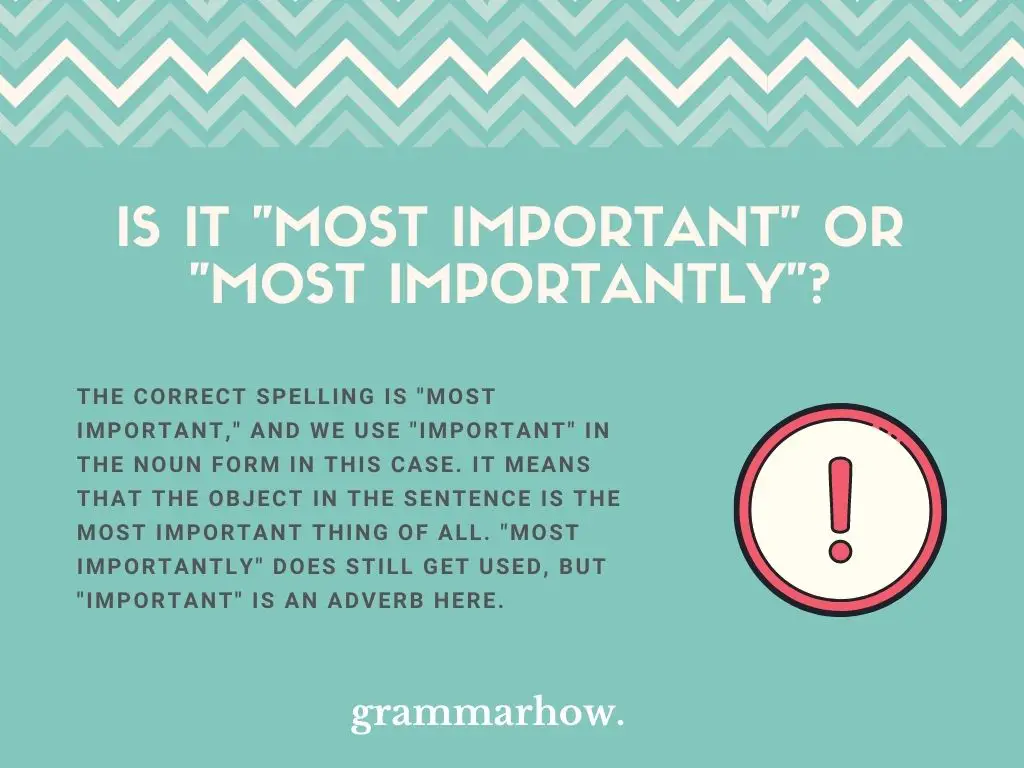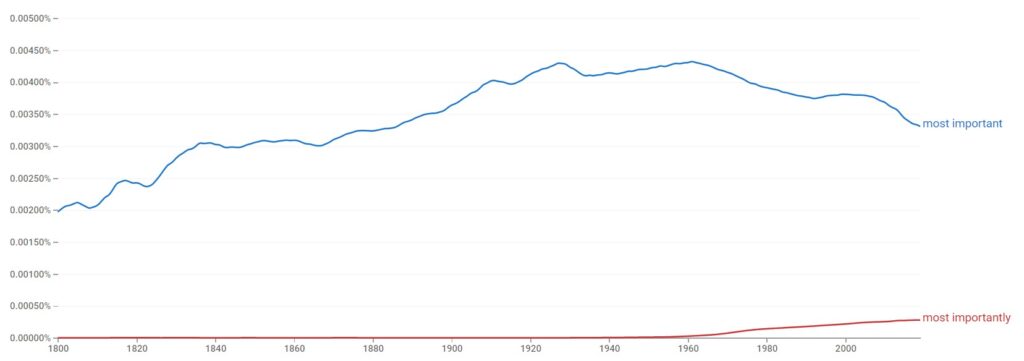When we use “important” as a noun or an adverb, it slightly changes the phrase’s meaning. It’s good to know what this differentiation becomes when we use it so we can tell when to use one over the other.
Is It “Most Important” Or “Most Importantly”?
The correct spelling is “most important,” and we use “important” in the noun form in this case. It means that the object in the sentence is the most important thing of all. “Most importantly” does still get used, but “important” is an adverb here.

If you look at this graph, you’ll see the huge difference between the two phrases in English. While both are technically correct, “most important” is by far the most popular of the two words. “Most importantly” didn’t even start to get used until the 1960s and never really took off.

Is “But Most Importantly” Grammatically Correct?
Some people believe that starting a sentence with “but” is incorrect; however, it actually works really well in this situation.
“But most importantly” is grammatically correct, and you’re able to start the sentence with “but” when you use it.
Typically, “but most importantly” is the most common way to use “most importantly” as a phrase. That’s because in the adverb form, “importantly” shows when a particular thing is the most important thing in that sentence to mention.
For example, if you made a list, you could introduce the sentence after as “but most importantly,” to show the most important thing of that list.
Does The Same Rule Apply To “More Important” And “More Importantly”?
The same rules are extended when we replace the word “most” with “more.”
“More important” is the comparative adjective, while “most important” is the superlative adjective. However, both of these words follow the same rules when we use them in a sentence in this manner.
“More importantly” is also correct, but we usually have to start by writing “but,” just like we mentioned above.
Should You Place A Comma After “Most Important” And “Most Importantly”?
Usually, we don’t need to place a comma after “most important” if we’re using it in a sentence as an adjective. For example,
- The most important thing.
This shows that we’re modifying “thing” in the sentence, and a comma is not needed.
However, “most importantly” is a construct designed to introduce an idea. That means we need to include a comma after it.
- Most importantly, you’re all safe.
7 Examples Of How To Use “Most Important” In A Sentence
Let’s see some examples of the phrases in action. It’s good to get some experience with reading them; that way, you might be able to start using them yourself when you get more comfortable with them.
- The most important thing for you to remember from this lesson is what?
- You’re the most important person in my life.
- Most important of all is that we don’t forget each other.
- It’s the most important time of our life.
- This is the most important gift I’ve ever received.
- Most important to me is my family.
- What’s most important to you?
Every time we use “most important,” it’s written as an adjective and typically gets used to modify a noun.
7 Examples Of How To Use “Most Importantly” In A Sentence
Now let’s see “most importantly” in action. It’s not very common, but it still works grammatically, so it’s good to show you how to use it.
- But most importantly, remember this lesson.
- But most importantly, don’t forget about us.
- Most importantly, you should keep your friends close.
- Most importantly, you have embraced the sport!
- But most importantly, you’ve earned this trophy.
- But most importantly, I love my mom and my dad.
- Most importantly, you can find what you’re looking for.
As you can see, we always place a comma after “most importantly.” We don’t always need to include “but,” but it definitely helps with the sentence flow.
Most Important/Importantly – Synonyms
Finally, let’s look at some synonyms and alternatives that you can use in place of these two phases. That’ll help you convey the same meaning you want without worrying about the language rules!
- Crucially
“Crucial” is synonymous with “important,” which makes “crucially” a really good synonym.
- Notably
Saying something is “notable” shows its importance in a body of text.

Martin holds a Master’s degree in Finance and International Business. He has six years of experience in professional communication with clients, executives, and colleagues. Furthermore, he has teaching experience from Aarhus University. Martin has been featured as an expert in communication and teaching on Forbes and Shopify. Read more about Martin here.
